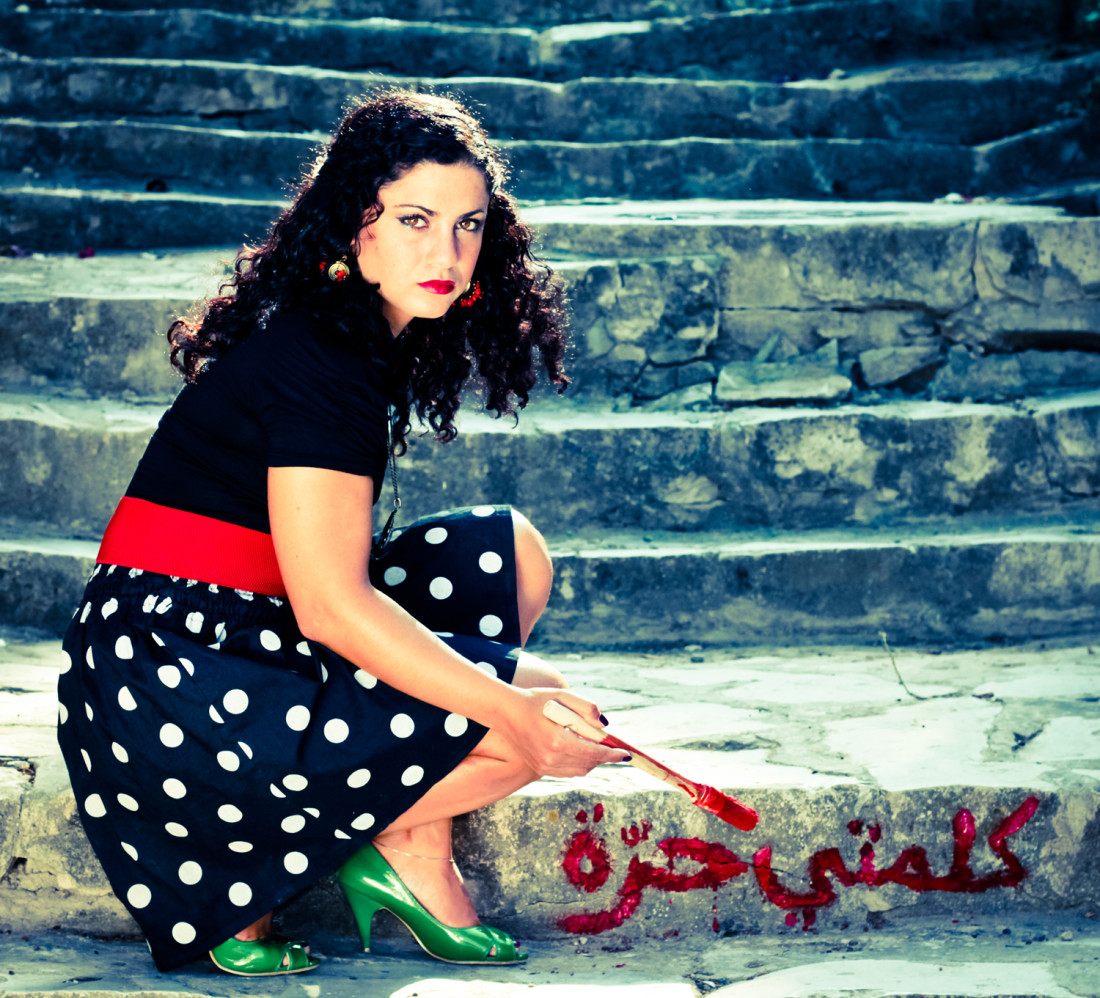Singer-songwriter Emel Mathlouthi says she’ll always feel a connection to protest songs. She’s long been inspired by the likes of Joan Baez, Bob Dylan and Argentine singer Mercedes Sosa. But for her new album, due out in September, “I took a very different turn,” she says.
It’s a bold move for the musician known as the “Voice of the Tunisian Spring.” Mathlouthi’s songs were banned from the radio in her home country, so she relocated to Paris where she recorded her debut studio album, Kelmeti Horra (My Word is Free). “We are free men who are not afraid / we are the secrets that never die / and we are the voice of those who resist / in their chaos, we are the flash of light,” she sings on the title track. That song and “Ya Tounes Ya Meskina” (Poor Tunisia) were adopted as anthems during the Tunisian revolution.
Mathlouthi performs at UNC Asheville’s Lipinsky Auditorium on Thursday, March 24. The 1 Million Stars to End Violence project exhibition, an initiative aimed at ending all forms of violence, opens in the Lipinsky Hall lobby before the concert. Earlier that day, Mathlouthi will discuss her work, the music of Tunisia and the electronic sounds that inspire her during a free, public master class — including performances from her band — at the Humanities Lecture Hall.
On Mathlouthi’s forthcoming album, while her cinematic aesthetic is intact, she took inspiration from her contemporaries, such as Norweigan singer-songwriter Susanne Sundfør and Icelandic band Samaris. “I wanted to explore modern forms,” she says. “I didn’t want my album to sound nostalgic or old. I wanted to be able to [create] an album that’s partly North African but could also share [space] with what’s new in the music sphere.”
Part of that shift was prompted by a move to New York two years ago. Mathlouthi now lives in that city with her husband. While the musician jokes that it didn’t take much to talk her into the relocation, she also points out that the change in environment has meant she, too, needed to evolve. “I don’t feel limits, I feel very creative,” she says. “I feel very big vibes.”
Mathlouthi describes a similar sense of freedom when she first settled in Paris. “I was very prolific,” she says. She remembers using her city guide to suss out free concerts and listening to music from all over the world. Since then, the singer-songwriter has traveled the globe, performing at the 3alganoob Music Festival in Cairo, the Sfinks festival in Boechout and opening for Dead Can Dance at Les Nuits de Fourvière in Lyon. Her Twitter account documents tours around the U.S. and a trip to New Zealand, where she played international arts festival WOMAD and bonded with Atlanta hip-hop collective Arrested Development.
More recently, Mathlouthi performed at the 2015 Nobel Peace Prize Concert. “People told me my song gave them hope, and that was my biggest reward,” she says. “Although [I played] the same songs people know from before, it gave me definite recognition.” This is important because, as an international artist, the media in her home country don’t report on her accomplishments unless they’re on the scale of a Grammy win or, say, playing the Nobel Peace Prize Concert.
For Mathlouthi, an ongoing challenge is to be able to succeed as someone who sings in Arabic in the Western world. She says it’s equally hard to further her career in the Arab countries as an artist who pushes boundaries of creativity, music and free speech — and that makes all of Mathlouthi’s work political. “If I succeed internationally, I’ll have more power to come back to the Arab world,” she says.
Despite those hurdles, and the admission that she’s pushing barriers of race, language and conservatism, the singer-songwriter still approaches her work with an open mind and a delight in the process. Even her past success as a purveyor of political songs doesn’t haunt her with a need to repeat those efforts. “The only pressure I feel is to create very rich and deep music,” she says. “It scares me if I’m not able to be creative anymore [so], I let myself be inspired and be as true to myself as possible. If I can do that, I don’t really worry about how the audience is going to see me.”
Mathlouthi adds, “I’m not interested in just writing music. I’m interested in making art.”
WHO: Emel Mathlouthi
WHERE: UNC Asheville’s Lipinsky Auditorium, avl.mx/2af
WHEN: Thursday, March 24, 7 p.m. $20 general/$13 UNCA community/$8 area students/$6 UNCA students




Before you comment
The comments section is here to provide a platform for civil dialogue on the issues we face together as a local community. Xpress is committed to offering this platform for all voices, but when the tone of the discussion gets nasty or strays off topic, we believe many people choose not to participate. Xpress editors are determined to moderate comments to ensure a constructive interchange is maintained. All comments judged not to be in keeping with the spirit of civil discourse will be removed and repeat violators will be banned. See here for our terms of service. Thank you for being part of this effort to promote respectful discussion.